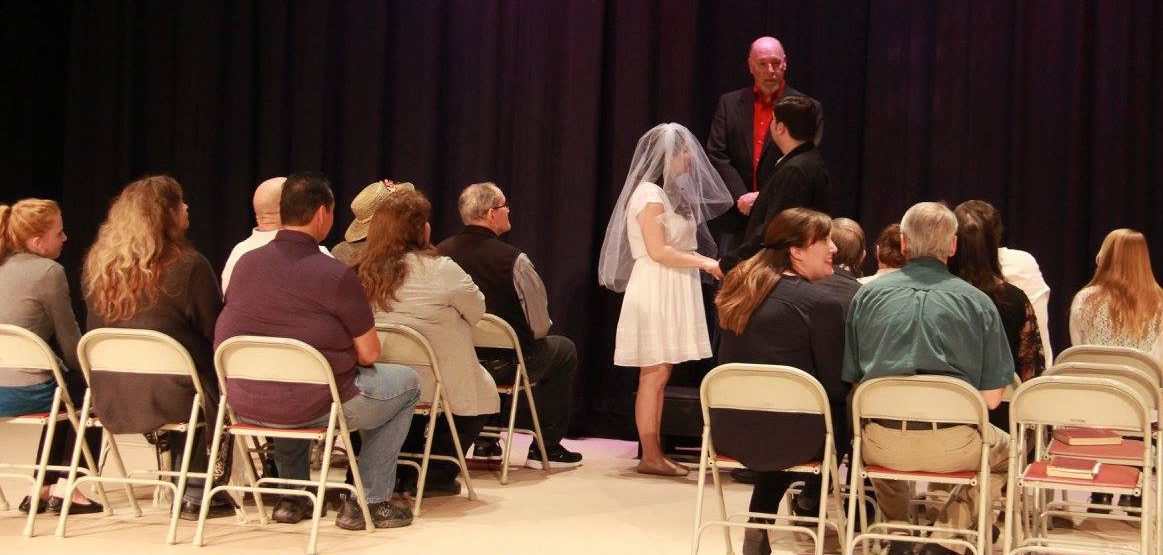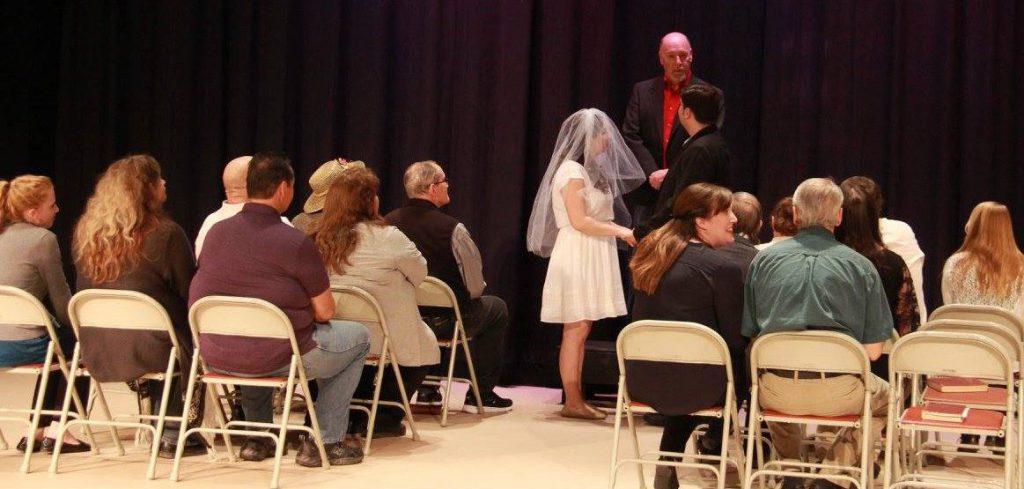

Our Town is an American classic. It’s been produced a metric bazillion times by… I dunno, like a few hundred theaters? It’s also one of the most misunderstood shows by directors and producers.
Not too long ago, I was cast in a local production of Our Town. This play serves one simple purpose: to show an audience a picture of life, from start to finish. We see in it joy and sorrow, the exciting and the mundane, and everything big, small, and in between. What makes it unique and special is that its author, Thornton Wilder, intentionally forwent many of the staples of theater to create this picture. And that’s really where so many productions of this show get it wrong. They try to shoehorn the script into a more traditional style of theater, and in doing so trample all over what makes it such a brilliant show.
I’ll explain how, but I warn you, there are spoilers ahead (Yes, I’m giving you a spoiler warning for a 78-year-old story. What are you gonna do about it?):
The audience as a character
This is an interesting concept, and one that takes a few forms. In the first act, there are three actors planted in the audience, who deliver lines as audience members. They’re not major characters, and their actual lines mostly just serve as launching points for exposition dumps, but their very presence serves another more subtle purpose: They are blurring the line between the audience and the actors, and helping to eliminate the fourth wall. To further this concept, the Stage Manager character steps aside as from his role as narrator and asks a character from within the play (Mr. Webb) to directly respond to these audience questions. In the second act, something similar happens, when his wife Mrs. Webb steps away from the scene to rant at the audience. Though the audience doesn’t speak this time, she explicitly acknowledges their presence in her monologue. This is especially interesting because she is not a central character to this scene outside of her rant; her feelings don’t matter and she has no actions. All she accomplishes is to break the fourth wall.
Narration as a conversation
Building on the idea of the audience as a character is the idea that the narration isn’t just narration. The Stage Manager isn’t just presenting a story to us as we watch and listen, but having a conversation with us. Where a typical narrator would provide relevant facts and backstory, the Stage Manager sometimes rambles about the irrelevant. He is presented not just as a narrator, but as a person. Adding to this, he acknowledges the audience virtually the entire time he is narrating. He has lines like, “What do you say, folks? What do you think?” and, “We’ve got a factory in our town too hear it?”. This brings a genuinely conversational tone to the narration, and helps the audience see the Stage Manager almost more as one of them than as a character in the play.
You’re a narrator now, you’re a character now
The Stage manager is a character in the play though. In fact, he’s several.. He fills in for characters without their own actors, and interacts directly with other characters even within the confines of the story. In the first act, George bumps into an invisible Mrs. Forrest, whose response takes the form of the Stage Manager’s voice from a distance. In the second act, he joins the cast slightly more directly, taking the places of both Mr. Morgan the druggist and the wedding minister to become a real part of the scene. In the third act, he joins the scene directly as himself, conversing with Emily about the nature of death and the world. By playing the mutually incompatible roles of both a person outside the play and characters inside, the Stage Manager even further blurs the line between the play and its audience.
No props, chairs only, (final destination)
By design, sets are extremely minimalistic. Two tables, two ladders, some chairs, two trellises, and a plank. No backdrops, no walls, no doors, none of that. Props are even more minimalistic, insofar as there are none. Actions are pantomimed, whether cooking, eating, carrying books, tossing a baseball… all of this is done with imagined items. This serves a few purposes. Most obviously, it brings their performances and emotions to the front, so that scenery, etc., aren’t a distraction, but it also helps narrow the gap between the real and the staged. (Noticing a theme yet?)
In the end it doesn’t even matter
Looking at all these pieces together, it is clear that Thornton Wilder’s goal was to meticulously tear down the fourth wall, to fiercely attack our suspension of disbelief, and to keep us in a constant state of awareness that we are at a theater, watching a play with actors on a stage. Our Town is not real life, nor a substitute for it. It is merely a picture of it. Like any photograph, it can never capture what it shows as fully as actually experiencing it. You can’t smell the grass in a photo, look what’s obscured behind the house in the photo, or hear what the old farmer on the porch is saying. But also like a photo, these limitations allow for a clearer focus, an emphasis on one specific aspect. You can better notice the perfect cut on the grass, the peeling paint on the house, and the grim look on the farmer’s face.
This is what Our Town‘s utter defeat of the fourth wall does. It places a hyper-focused emphasis on the most human elements of the story. It brings to the forefront the acting, the emotions, and the dialogue itself. Because of this, because so many ordinary, expected aspects of a play are missing, it’s more important to get what’s there absolutely right.
How most productions fall flat
When you’re working with material that does something different and special (whether for an original play or movie, or an adaptation of some other source material), the obvious response, I’d think, would be to let that shine through. Unfortunately, many directors and producers seem to have significant distrust for Thornton Wilder and his script, and make two severe mistakes that show an inherent misunderstanding of what he was aiming for.
Doing it as a period piece
The most common mistake I see is excess in anything that the script doesn’t explicitly forbid. The 2003 movie (and I would assume the 2002 Broadway revival it was made from), for example, is very heavy-handed with its costuming. This manages to confuse the audience by making them question why the sets are minimalistic but the costumes are not, which in turn distracts from the dialogue and characters, thus defeating the purpose of the minimalism in the first place.
In researching this article, I watched clips from several productions of this show. I went on YouTube and absorbed all I could get my hands on. What really struck me was that one of the most compelling performances I found was done in modern street clothes, and without 1903 accents. The actors didn’t play it as a period piece, but as people, which is precisely the goal of the play. There was a beautiful realism to it that was far more effective than the made-for-TV Hallmark movie quality that is so common, and the lack of period costumes really helped. I don’t quite agree with their interpretation of the scene’s tone (I feel it should be more awkward), but the emphasis on realism and the lack of pretension or sentimentality made it better than most I’ve seen.
Stage Manager as a person
Since the script makes it so overwhelmingly clear that the Stage Manager is having a conversation with the audience, it seems only appropriate that his acting conveys this. He should, if he exists in the same realm as the audience, be able to speak with them on their level, rather than as an affected monologue at them. It is, however, sadly common to see the Stage Manager played more as a narrator or an in-universe character. I’m not sure why any director would direct their actor to portray the role this way, or cast someone who sees it that way, but it is counterintuitive to the intent of the play. Treating the Stage Manager’s lines as narration, especially “folksy” narration, only serves to build back up that fourth wall that the script so rigorously attempts to tear down. I don’t know if people do this because they don’t understand the play, or if they think of Thornton Wilder’s intent as an obstacle to overcome rather than something to embrace, but either way it diminishes the quality of the end result.
The 2003 film is very guilty of this. I feel a bit bad saying it, because Paul Newman was absolutely excellent within the confines of this interpretation of the role, but the interpretation is strictly wrong. His performance is akin to building the most perfect set and painting the most beautiful backdrop; while the skill, expertise, effort, and workmanship that went into crafting such a thing cannot be denied, they are inescapably at odds with the intent of the script. Here’s an example of the Stage Manager played correctly. It’s natural. It’s conversational. It’s real. One community theater show I saw even had the Stage Manager do all the pre-show announcements (upcoming productions, turn off your electronics, etc.). If that’s not in spirit with the script as-written, I don’t know what is.
Conclusion
As I said at the start, I was recently cast in a local community theater production of Our Town. I’m playing George. This is all really personal to me, because our director does understand the play. When auditions were first announced, he put out a message with the announcement promising not to put on the overly-sentimental period piece that so many people have seen in high school productions, but to do something that really gets to the heart of the show and brings Thornton Wilder’s intentions to life as faithfully as possible. And by gum, he did. As merely an actor, I can’t take any credit for this. We actors merely learned lines and followed directions. But I can say I am mighty proud to have been involved with a show that, as best I can tell, is true to Wilder’s vision.
I will end with a message to anyone who happens to be doing (or considering doing) Our Town themselves: Please, oh please, get it right. Most community theaters, most high schools, and certainly all large commercial theaters have a bigger potential casting pool and more resources than we did in a small town like my hometown and with such a limited budget. We did it well, but I’m sure you have the capacity to do it better than us if only you do it right. So in your productions, remember: Our Town isn’t traditional theater, and shouldn’t be performed or produced like traditional theater. It is a conversation with an audience.
